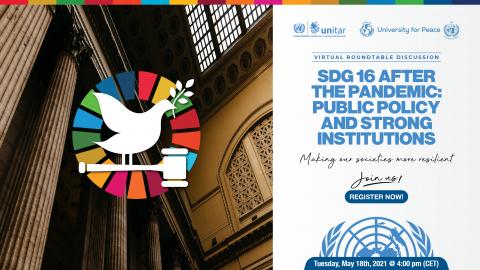
UNITAR Online Catalogue
SDG 16 after the pandemic: Public Policy and Strong Institutions

人类
University for Peace
背景信息
In light of the ongoing COVID-19 pandemic, the United Nations Institute for Training and Research (UNITAR) and University for Peace have joined efforts to host a special Virtual Roundtable on the role of public policy and strong institutions in the post-COVID era.
This event aims to discuss and highlight effective strategies and innovative solutions applicable in the context of public and institutional response to the pandemic, as well as to raise awareness about challenges and possible risks of the current pandemic on public institutions in the long term.
活动目标
The roundtable will touch on wider long-term impacts of the current pandemic on societies, their institutions and fundamental values of rule of law, human rights and good governance; and to explore possible policy options, approaches and best practices on how to deal with these challenges.
学习目标
For that aim, the discussion will focus the following guiding questions:
• What are the main institutional risks/threats of the current pandemic on our societies (beyond health
and economy)?
• What are the real-life examples on how to deal with them successfully?
• How can we be more conscious of these risks and equip our societies to be resilient?
• It is often said: “What matters is the quality, not quantity.” How does that apply to the goal of “strong
institutions” (SDG16) in the post-COVID context?
内容和框架
This event brings together representatives from these key stakeholder groups to discuss in practical terms the measures governments and other stakeholders can take to ensure that this vital component of our societies is not left behind – now more than ever.
目标受众
Participation is open to government officials, diplomats, staff of international organizations, development practitioners, faculty members, and administrators of educational institutions.